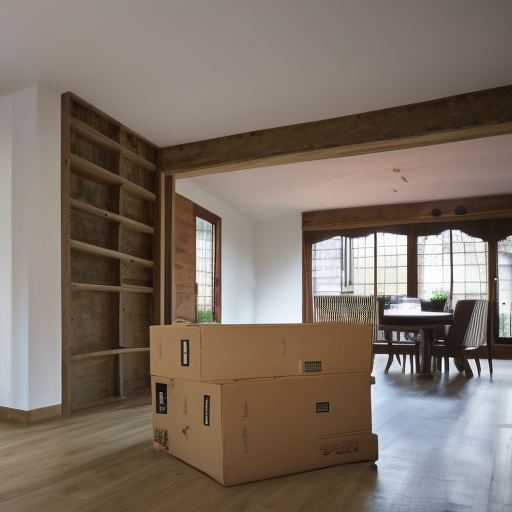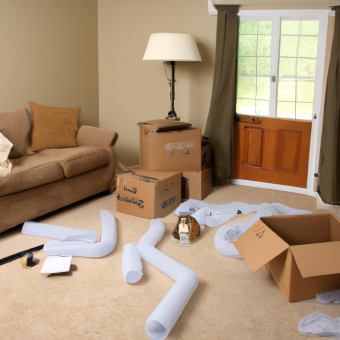Moving can be a stressful time, but packing your clothes doesn’t have to be. Expert Removals is here to guide you through the process of packing your clothes for a move.
In this article, we’ll cover common questions and provide clear, actionable advice to make your move smoother and more efficient.

What Materials Do I Need to Pack Clothes for a Move?
To pack your clothes efficiently, you’ll need the following materials:
- Cardboard boxes: Various sizes
- Wardrobe boxes: For hanging clothes
- Suitcases and duffel bags: For folded clothes
- Vacuum-seal bags: To save space
- Garbage bags: For a quick and cheap option
- Packing paper and bubble wrap: For delicate items
- Tape: Packing tape and masking tape
- Labels and markers: For organization
Estimated Costs
- Cardboard boxes: €1.50 – €3 each
- Wardrobe boxes: €15 – €20 each
- Vacuum-seal bags: €5 – €15 per set
- Tape: €3 – €5 per roll
How Do I Start Packing Clothes for a Move?
Step 1: Sort and Purge
Begin by sorting through your clothes. Donate, sell, or discard items you no longer need. This reduces the amount you have to pack and move.
Step 2: Organize by Season and Type
Pack off-season clothes first. Group similar items together, such as pants, shirts, and dresses.
What Are the Best Methods for Packing Different Types of Clothes?
Hanging Clothes
- Wardrobe Boxes: Use these for hanging clothes like suits, dresses, and coats. Simply transfer them from your closet to the box.
- Garbage Bags: Cut a small hole in the bottom of a garbage bag and pull it over a group of hangers, tying the open end.
Folded Clothes
- Suitcases and Duffel Bags: Ideal for packing folded clothes like t-shirts, jeans, and sweaters. This also saves on buying extra boxes.
- Cardboard Boxes: Lay heavier items at the bottom and lighter items on top. Line the box with packing paper for extra protection.
Delicate Items
- Packing Paper and Bubble Wrap: Wrap delicate items like silk dresses and suits in packing paper or bubble wrap before placing them in boxes.
How Can I Maximize Space When Packing Clothes?
Vacuum-Seal Bags
These are perfect for bulky items like winter coats and blankets. The bags compress the air out, significantly reducing the space needed.
Rolling Clothes
Rolling clothes instead of folding them can save space and reduce wrinkles. This method is particularly effective for t-shirts, jeans, and casual wear.
How Should I Label Boxes and Bags?
Labeling is crucial for easy unpacking:
- Color Code: Use different colored markers or labels for different rooms (e.g., blue for the bedroom, red for the living room).
- Detailed Labels: Write detailed labels on each box, specifying the contents and intended room (e.g., “Winter Clothes – Bedroom”).
Quick Tips for Packing Clothes for a Move
- Pack an Essentials Bag: Include a few days’ worth of clothes, toiletries, and necessary items in a separate bag.
- Avoid Overpacking: Keep boxes under 50 pounds to prevent them from breaking and to make them easier to carry.
- Use Shoe Boxes: Pack shoes in their original boxes and place them in a larger box or suitcase.

Types of Clothes You Should Not Pack Into Smaller Boxes
When packing for a move, it’s important to choose the right size boxes for different types of clothes to ensure they remain in good condition and are easy to manage. Here are the types of clothes you should avoid packing into smaller boxes:
What Types of Clothes Are Best Kept Out of Smaller Boxes?
Hanging Clothes
- Suits, Dresses, and Coats: These items are best packed in wardrobe boxes to prevent wrinkles and damage.
- Blazers and Jackets: Like suits and coats, these items should stay on hangers to maintain their shape.
Bulky Items
- Winter Coats and Heavy Jackets: These items are too bulky for small boxes. Use larger boxes or vacuum-seal bags to save space.
- Sweaters and Hoodies: Heavy and thick clothing should be packed in medium to large boxes to avoid overstuffing and damaging smaller boxes.
Delicate and Expensive Items
- Silk and Lace Garments: These should be packed carefully in larger boxes with plenty of packing paper or bubble wrap to prevent damage.
- Wedding Dresses and Formal Wear: Use special garment bags or wardrobe boxes to protect these valuable items.
Shoes
- Multiple Pairs: Packing many pairs of shoes in a small box can cause them to get crushed. Use larger boxes or their original shoe boxes within a larger box.
Accessories
- Hats: Large hats should not be crammed into small boxes. Use larger boxes to maintain their shape.
- Handbags: Especially structured handbags should be placed in larger boxes with protective padding.
Why Should These Clothes Not Be Packed in Smaller Boxes?
Space Constraints
Small boxes can easily become overfilled, leading to potential damage to both the box and the items inside. Clothes need room to breathe to avoid wrinkles and damage.
Weight Distribution
Overpacking smaller boxes can make them very heavy and difficult to carry, increasing the risk of the box breaking or causing injury during the move.
Protection and Shape
Hanging clothes and delicate items require more space to ensure they remain in good condition. Smaller boxes do not provide the necessary room to accommodate protective wrapping and maintain the shape of these items.
Should I Hire Movers to Help Me Pack?
When planning a move, one crucial decision is whether to hire professional movers to help you pack. This choice depends on various factors including your budget, time constraints, and the complexity of your move. Below, we explore the benefits and considerations of hiring movers for packing.

What Are the Benefits of Hiring Movers to Help Pack?
Efficiency and Speed
Professional movers are experienced and can pack your belongings quickly and efficiently. This can be especially beneficial if you are short on time.
Expertise and Care
Movers know the best packing techniques to ensure your items are protected during transit. They use high-quality packing materials and methods to minimize damage.
Reduced Stress
Packing is often the most stressful part of moving. Hiring movers can relieve you of this burden, allowing you to focus on other aspects of your move.
Insurance and Liability
Professional moving companies offer insurance options that cover any potential damage to your belongings during the move. This provides an extra layer of security.
What Are the Considerations When Hiring Movers?
Cost
Hiring professional movers can be expensive. The cost of movers varies based on the volume of items, distance, and specific services required.
Estimated Costs
- Full-Service Packing: $500 – $1,500+ depending on the size of your home and volume of items.
- Packing Materials: Additional costs for boxes, bubble wrap, and packing paper if not included in the service.
Control Over Packing
Some people prefer to pack their own belongings to ensure everything is organized according to their preferences. If you have specific packing preferences or valuable items, this is an important consideration.
Trust and Security
Allowing strangers to handle your personal belongings can be a concern for some people. It’s important to hire reputable movers with good reviews and proper credentials.
When Is Hiring Movers the Best Option?
Large or Complex Moves
If you have a large home or many delicate and valuable items, hiring movers can ensure everything is packed properly and safely.
Limited Time
If you are on a tight schedule and can’t dedicate the necessary time to pack, professional movers can get the job done quickly.
Physical Limitations
For those with physical limitations or health issues, hiring movers can prevent injury and make the moving process much more manageable.

DIY Packing vs. Professional Movers: A Comparison
| Aspect | DIY Packing | Professional Movers |
|---|---|---|
| Cost | Lower (mainly materials) | Higher (labor and materials) |
| Time | More time-consuming | Quick and efficient |
| Expertise | Limited packing knowledge | Experienced and skilled |
| Stress | Potentially high stress | Reduced stress |
| Control | Full control over packing process | Less control, trust needed |
| Insurance | Limited or none | Often provided by moving company |
Conclusion
Packing clothes for a move doesn’t have to be overwhelming. With the right materials and methods, you can pack efficiently and effectively.
By sorting, organizing, and using space-saving techniques, you’ll ensure that your clothes arrive at your new home in good condition. Remember, if you need any assistance, Expert Removals is here to help make your move as smooth as possible.
